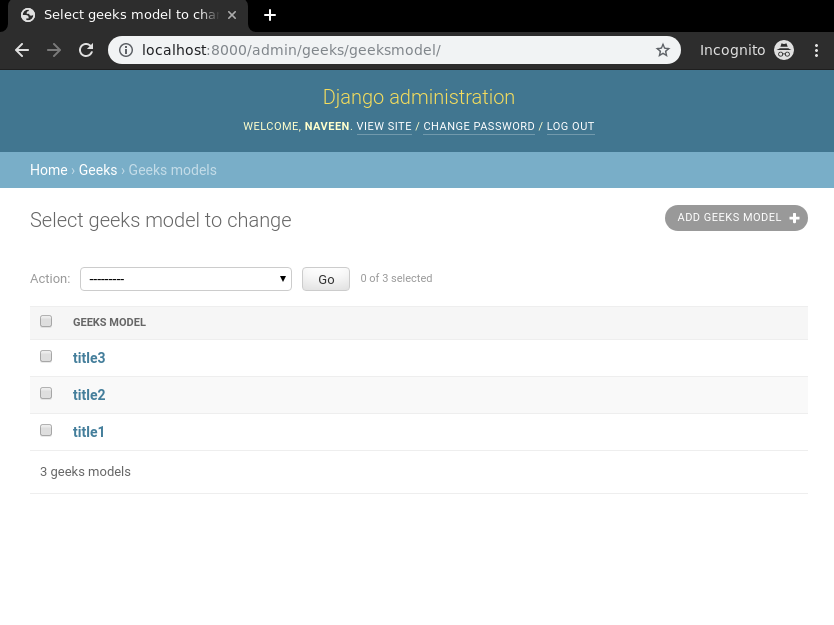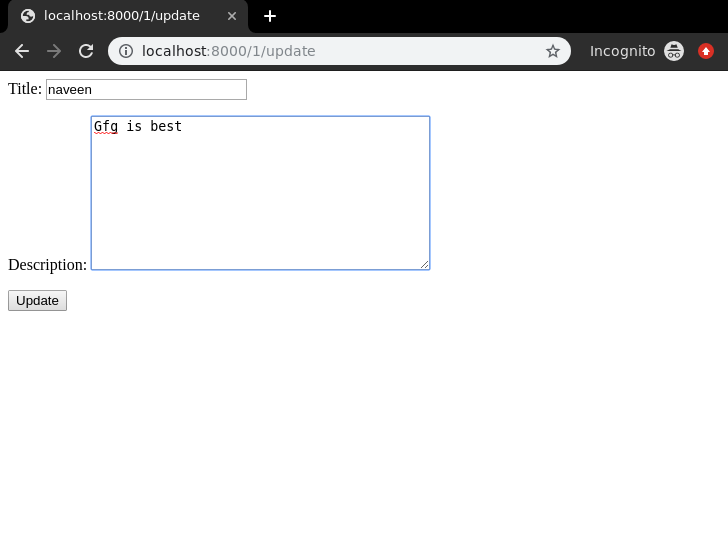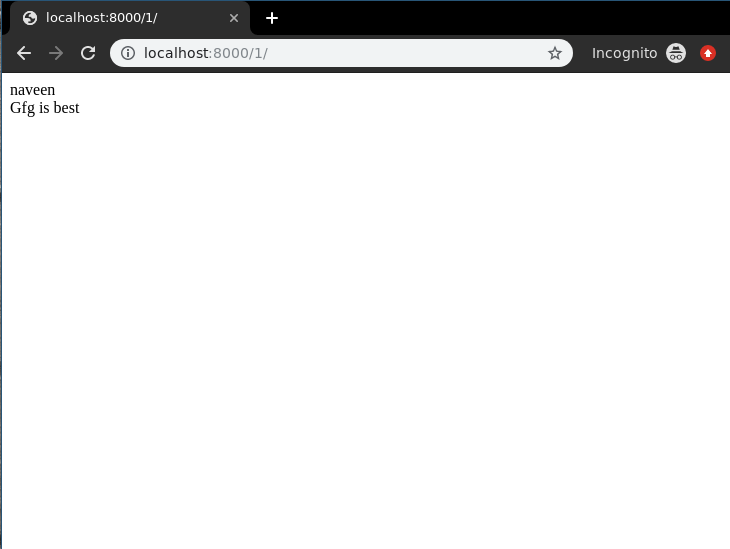更新视图——基于函数的视图 Django
更新视图是指一种视图(逻辑),用于从数据库中更新表的特定实例,并提供一些额外的细节。它用于更新数据库中的条目,例如,更新 geeksforgeeks 上的文章。所以更新视图必须在表单中显示旧数据,并让用户只从那里更新数据。 Django 为更新视图提供了非凡的支持,但让我们检查一下它是如何通过基于函数的视图手动完成的。本文围绕更新视图展开,其中涉及到 Django Forms、Django Models 等概念。
对于更新视图,我们需要一个包含一些模型和多个实例的项目,它们将被显示。基本上,更新视图是详细视图和创建视图的组合。
Django 更新视图——基于函数的视图
如何使用示例创建和使用更新视图的说明。考虑一个名为 geeksforgeeks 的项目,它有一个名为 geeks 的应用程序。
Refer to the following articles to check how to create a project and an app in Django.
- How to Create a Basic Project using MVT in Django?
- How to Create an App in Django ?
在你有一个项目和一个应用程序之后,让我们创建一个模型,我们将通过我们的视图创建它的实例。在 geeks/models.py 中,
Python3
# import the standard Django Model
# from built-in library
from django.db import models
# declare a new model with a name "GeeksModel"
class GeeksModel(models.Model):
# fields of the model
title = models.CharField(max_length = 200)
description = models.TextField()
# renames the instances of the model
# with their title name
def __str__(self):
return self.titlePython3
from django import forms
from .models import GeeksModel
# creating a form
class GeeksForm(forms.ModelForm):
# create meta class
class Meta:
# specify model to be used
model = GeeksModel
# specify fields to be used
fields = [
"title",
"description"]Python3
from django.urls import path
# importing views from views..py
from .views import update_view, detail_view
urlpatterns = [
path('/', detail_view ),
path('/update', update_view ),
] Python3
from django.shortcuts import (get_object_or_404,
render,
HttpResponseRedirect)
# relative import of forms
from .models import GeeksModel
from .forms import GeeksForm
# after updating it will redirect to detail_View
def detail_view(request, id):
# dictionary for initial data with
# field names as keys
context ={}
# add the dictionary during initialization
context["data"] = GeeksModel.objects.get(id = id)
return render(request, "detail_view.html", context)
# update view for details
def update_view(request, id):
# dictionary for initial data with
# field names as keys
context ={}
# fetch the object related to passed id
obj = get_object_or_404(GeeksModel, id = id)
# pass the object as instance in form
form = GeeksForm(request.POST or None, instance = obj)
# save the data from the form and
# redirect to detail_view
if form.is_valid():
form.save()
return HttpResponseRedirect("/"+id)
# add form dictionary to context
context["form"] = form
return render(request, "update_view.html", context)HTML
HTML
{{ data.title }}
{{ data.description }}
创建此模型后,我们需要运行两个命令才能为其创建数据库。
Python manage.py makemigrations
Python manage.py migrate现在让我们使用 shell 创建这个模型的一些实例,运行表单 bash,
Python manage.py shell输入以下命令
>>> from geeks.models import GeeksModel
>>> GeeksModel.objects.create(
title="title1",
description="description1").save()
>>> GeeksModel.objects.create(
title="title2",
description="description2").save()
>>> GeeksModel.objects.create(
title="title2",
description="description2").save()现在我们已经为后端做好了一切准备。验证是否已从 http://localhost:8000/admin/geeks/geeksmodel/ 创建实例

现在我们将为这个模型创建一个 Django ModelForm。有关 modelform 的更多信息,请参阅本文 – Django ModelForm – 从模型创建表单。在 geeks 文件夹中创建文件 forms.py,
Python3
from django import forms
from .models import GeeksModel
# creating a form
class GeeksForm(forms.ModelForm):
# create meta class
class Meta:
# specify model to be used
model = GeeksModel
# specify fields to be used
fields = [
"title",
"description"]
对于 Update_view,需要一些标识来获取模型的特定实例。通常它是唯一的主键,例如id 。要指定这个标识,我们需要在 urls.py 中定义它。转到极客/urls.py,
Python3
from django.urls import path
# importing views from views..py
from .views import update_view, detail_view
urlpatterns = [
path('/', detail_view ),
path('/update', update_view ),
]
让我们用解释创建这些视图。在 geeks/views.py 中,
Python3
from django.shortcuts import (get_object_or_404,
render,
HttpResponseRedirect)
# relative import of forms
from .models import GeeksModel
from .forms import GeeksForm
# after updating it will redirect to detail_View
def detail_view(request, id):
# dictionary for initial data with
# field names as keys
context ={}
# add the dictionary during initialization
context["data"] = GeeksModel.objects.get(id = id)
return render(request, "detail_view.html", context)
# update view for details
def update_view(request, id):
# dictionary for initial data with
# field names as keys
context ={}
# fetch the object related to passed id
obj = get_object_or_404(GeeksModel, id = id)
# pass the object as instance in form
form = GeeksForm(request.POST or None, instance = obj)
# save the data from the form and
# redirect to detail_view
if form.is_valid():
form.save()
return HttpResponseRedirect("/"+id)
# add form dictionary to context
context["form"] = form
return render(request, "update_view.html", context)
现在在模板文件夹中创建以下模板,
在 geeks/templates/update_view.html 中,
HTML
在 geeks/templates/detail_view.html 中,
HTML
{{ data.title }}
{{ data.description }}
让我们检查一下是否一切正常,访问 http://localhost:8000/1/update。

在这里您可以看到已经从实例中填充数据的表单,现在可以轻松地编辑和更新这些数据,让我们来看看

点击更新并完成。
